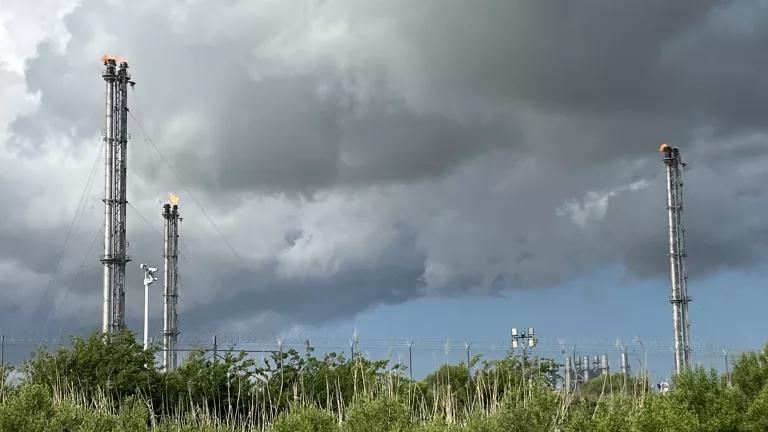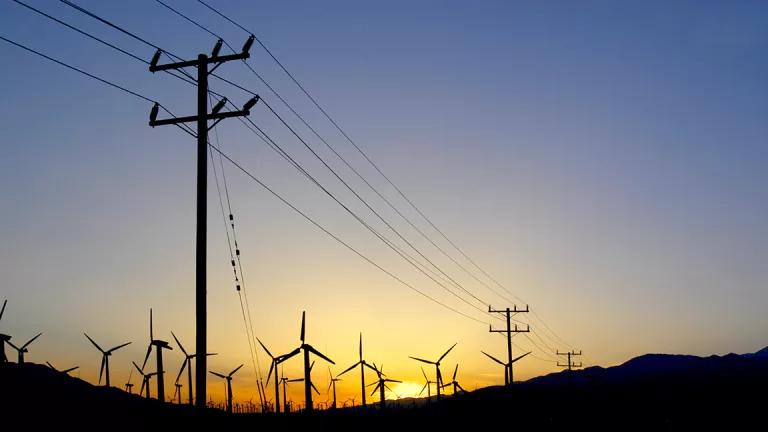Suspending Methane Protections: Unauthorized & Unwarranted
Our health and our planet depend on the critical climate and air quality protections at issue in the EPA's recently-issued proposals, and we do not have time to put them on hold.
EPA recently issued proposals to put on hold provisions of its oil and gas sector standards that would require operators to inspect for and repair leaks of methane from oil and gas infrastructure. Yesterday we had the opportunity to testify before EPA in a public hearing, to make our case for why these proposed delays are unauthorized by law and will cause harm to people and the planet. Here are some excerpts from our testimony.
***
EPA’s proposals to stay these commonsense provisions of a lawfully-promulgated rule are unwarranted and unauthorized by law. Our health and our planet depend on the critical climate and air quality protections at issue in these EPA actions, and we do not have time to put them on hold.
The oil and gas sector is the largest U.S. industrial emitter of methane, which is the second-biggest driver of climate change after carbon dioxide. In addition to methane, oil and gas operations leak cancer-causing benzene and other toxic chemicals into the air, increasing the risk of some cancers, heart and lung problems, neurological disorders, and birth defects.
More than 12 million Americans live close enough to oil and gas development to be harmed by these pollutants. In these communities, children and the elderly are the most vulnerable to the impacts of air pollution. In fact, in its proposal EPA admitted that “the environmental health or safety risk addressed by this action may have a disproportionate effect on children.”
By 2025, this standard will prevent emissions of approximately 210,000 tons of harmful volatile organic compounds and 3,900 tons of hazardous air pollutants. These pollution reductions will help address the approximately 750,000 childhood asthma attacks, 2,000 asthma-related emergency room visits, and 600 hospital admissions each year associated with the oil and gas industry.
The Proposed Stays Are Unauthorized by Law
The leak detection and repair requirements of the methane standards were developed through two years of concerted agency rulemaking, and are grounded in many years of experience with leak detection and repair equipment and program designs. They are based on a substantial record demonstrating the feasibility and low cost of the measures. As we set forth in our prior comments, EPA would have been justified in adopting more stringent requirements.
EPA lacks the authority under the Clean Air Act to issue either proposed stay.
As the D.C. Circuit recently held in Clean Air Council v. Pruitt, EPA has no inherent authority to stay properly promulgated regulations. Instead, the agency must either comply with the notice-and-comment requirements of the Administrative Procedure Act to amend a rule or otherwise find express authorization for a stay in the APA or the Clean Air Act.
The court clarified that EPA has authority to issue a 90-day stay pursuant to section 307(d)(7)(B) of the Clean Air Act only when that section requires the agency to open a reconsideration proceeding—that is, when a stakeholder petitioning for reconsideration has raised an objection of “central relevance” to the outcome of the rule, which was “impracticable” to raise during the period for public comment. Without such a demonstration, reconsideration is not mandatory, and the agency has no authority to enact a stay. The court found that the industry stakeholders who petitioned for reconsideration failed to make this showing, and therefore EPA acted beyond its authority in staying the rule.
Now, EPA has no authority to extend a stay that it had no authority to issue in the first place.
This point is made all the more obvious by EPA’s patent failure to cite any statutory basis for these two proposed stays. To justify the proposed 3-month stay, EPA notes only a desire to avoid a potential gap in coverage between its initial 3-month stay—which has now been deemed illegal—and its proposed, unauthorized 2-year stay. And to justify that 2-year stay, EPA simply claims to need more time to amend the provisions it is attempting to “reconsider,” despite that these provisions were fully vetted through notice and comment in the original rulemaking.
There is simply no basis for staying these provisions under the Clean Air Act.
Commonsense Protections Are Supported by Americans
In a perfect world, natural gas companies would want to do everything they could to make the process of extracting natural gas as safe as possible. But voluntary efforts have not worked—for example, over the last twenty years, only one percent of the industry has participated in EPA’s Natural Gas STAR Program.
It is the job of the EPA to protect the health and safety of the American people. The standards for the oil and gas sector—and specifically the requirements to inspect for and repair leaks—do exactly that, while still allowing for the industry to grow. These commonsense measures to reduce waste are smart economically and provide critical public health protections. It’s no wonder that this rule is supported by 60 percent of American voters as well as businesses, unions, public health officials and faith leaders.
***
This rule was properly promulgated and has been in effect for over a year. There is no statutory justification for suspending it. EPA must withdraw these unauthorized, unwarranted proposed stays to prevent the harms to public health and our climate they will cause.
EPA is accepting comments on the proposals until August 9. You can make your voice heard here.



